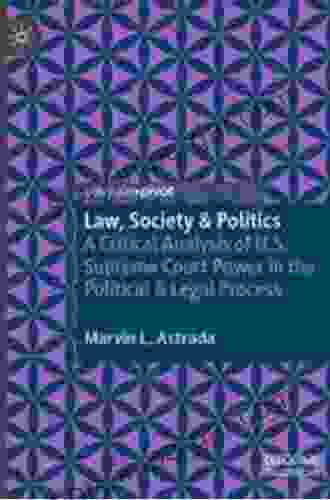Critical Analysis of Supreme Court Power in the Political Legal Process: A Comprehensive Guide

5 out of 5
| Language | : | English |
| File size | : | 628 KB |
| Text-to-Speech | : | Enabled |
| Screen Reader | : | Supported |
| Enhanced typesetting | : | Enabled |
| Word Wise | : | Enabled |
| Print length | : | 178 pages |
The Supreme Court of the United States is the highest court in the land and has the power to interpret the Constitution and strike down laws that it finds to be unconstitutional. This power, known as judicial review, gives the Court a significant amount of influence over American society and law.
In this article, we will provide a critical analysis of the Supreme Court's power in the political legal process. We will examine the Court's history, its role in the separation of powers, and its impact on American society. We will also discuss the different theories of judicial interpretation and how they have shaped the Court's decisions.
The History of the Supreme Court
The Supreme Court was established in 1789 by the Judiciary Act. The Court's original jurisdiction was limited to cases involving the federal government, but it has since been expanded to include cases involving state governments and private parties.
The Supreme Court has played a major role in American history. It has ruled on some of the most important issues facing the nation, including slavery, civil rights, and the separation of church and state. The Court's decisions have had a profound impact on American society and law.
The Court's Role in the Separation of Powers
The Supreme Court is one of the three branches of the federal government. The other two branches are the legislative branch (Congress) and the executive branch (the President). The separation of powers is a system of government in which each branch has its own powers and responsibilities.
The Supreme Court's role in the separation of powers is to interpret the Constitution and to strike down laws that it finds to be unconstitutional. This power gives the Court a significant amount of influence over the other two branches of government.
The Court's Impact on American Society
The Supreme Court's decisions have a profound impact on American society. The Court's rulings have shaped the nation's laws, policies, and social norms.
Some of the most important Supreme Court decisions include:
- Marbury v. Madison (1803): This case established the principle of judicial review.
- Dred Scott v. Sandford (1857): This case ruled that slaves were not citizens and could not sue in federal court.
- Brown v. Board of Education (1954): This case ruled that racial segregation in public schools was unconstitutional.
- Roe v. Wade (1973): This case ruled that women have a constitutional right to abortion.
- Citizens United v. FEC (2010): This case ruled that corporations have the same free speech rights as individuals.
These are just a few examples of the many important decisions that the Supreme Court has made. The Court's decisions have had a profound impact on American society and law.
Theories of Judicial Interpretation
There are a number of different theories of judicial interpretation. These theories provide different frameworks for interpreting the Constitution and other laws.
Some of the most common theories of judicial interpretation include:
- Textualism: This theory focuses on the plain meaning of the text of the Constitution and other laws.
- Originalism: This theory focuses on the original intent of the framers of the Constitution and other laws.
- Purposivism: This theory focuses on the purpose of the Constitution and other laws.
- Living constitutionalism: This theory believes that the Constitution is a living document that should be interpreted in light of changing social and political conditions.
The Supreme Court has used a variety of different theories of judicial interpretation to decide cases. The Court's choice of theory often depends on the specific case and the justices' own personal philosophies.
The Supreme Court of the United States is a powerful institution that has a significant impact on American society and law. The Court's decisions have shaped the nation's history, and they continue to shape the nation's present and future.
It is important to understand the Supreme Court's power and how it is used. This understanding can help us to make informed decisions about the laws that we want to live under.
5 out of 5
| Language | : | English |
| File size | : | 628 KB |
| Text-to-Speech | : | Enabled |
| Screen Reader | : | Supported |
| Enhanced typesetting | : | Enabled |
| Word Wise | : | Enabled |
| Print length | : | 178 pages |
Do you want to contribute by writing guest posts on this blog?
Please contact us and send us a resume of previous articles that you have written.
 Book
Book Novel
Novel Page
Page Chapter
Chapter Text
Text Story
Story Genre
Genre Reader
Reader Library
Library Paperback
Paperback E-book
E-book Magazine
Magazine Newspaper
Newspaper Paragraph
Paragraph Sentence
Sentence Bookmark
Bookmark Shelf
Shelf Glossary
Glossary Bibliography
Bibliography Foreword
Foreword Preface
Preface Synopsis
Synopsis Annotation
Annotation Footnote
Footnote Manuscript
Manuscript Scroll
Scroll Codex
Codex Tome
Tome Bestseller
Bestseller Classics
Classics Library card
Library card Narrative
Narrative Biography
Biography Autobiography
Autobiography Memoir
Memoir Reference
Reference Encyclopedia
Encyclopedia Robert T Hunting
Robert T Hunting New Scientist
New Scientist Stanley Zaslau
Stanley Zaslau Matt Perman
Matt Perman Rebekah Drumsta
Rebekah Drumsta Molly Mcmaster Morgoslepov
Molly Mcmaster Morgoslepov Paul Girardi
Paul Girardi Matt Clayton
Matt Clayton Marlee Grace
Marlee Grace Tony Kushner
Tony Kushner Ruth Soukup
Ruth Soukup Omar Sakr
Omar Sakr Marin Sardy
Marin Sardy Roger Hargreaves
Roger Hargreaves Paul Robeson
Paul Robeson Maryalayne B Long
Maryalayne B Long Mary H Manhein
Mary H Manhein Mark Friedman
Mark Friedman Nick Baras
Nick Baras Shivendra Nandan
Shivendra Nandan
Light bulbAdvertise smarter! Our strategic ad space ensures maximum exposure. Reserve your spot today!

 Kazuo IshiguroUnveiling the Enigmatic Past: An Archaeology of Britain, Fifth to Eleventh...
Kazuo IshiguroUnveiling the Enigmatic Past: An Archaeology of Britain, Fifth to Eleventh... Jeffrey CoxFollow ·8k
Jeffrey CoxFollow ·8k Alec HayesFollow ·2.3k
Alec HayesFollow ·2.3k Connor MitchellFollow ·6.2k
Connor MitchellFollow ·6.2k Benjamin StoneFollow ·5.6k
Benjamin StoneFollow ·5.6k Zadie SmithFollow ·14.4k
Zadie SmithFollow ·14.4k Gage HayesFollow ·2.3k
Gage HayesFollow ·2.3k Eli BlairFollow ·7.6k
Eli BlairFollow ·7.6k William GoldingFollow ·3.7k
William GoldingFollow ·3.7k

 Roberto Bolaño
Roberto BolañoUnveiling the Beauty and History of the Medici Iris: A...
In the realm of...

 Theodore Mitchell
Theodore MitchellImproving Gut Health in Poultry: Unlocking the Path to...
In the ever-evolving field of...

 Victor Hugo
Victor HugoPersonalized Medicine with a Nanochemistry Twist:...
The future of healthcare...

 George Martin
George MartinA Year Of Wine: Perfect Pairings Great Buys And What To...
## Year of Wine: An Epic Journey Through the...

 Tom Hayes
Tom HayesDelve into the Enigmatic World of Southern Africa's...
Embark on a captivating journey through the...
5 out of 5
| Language | : | English |
| File size | : | 628 KB |
| Text-to-Speech | : | Enabled |
| Screen Reader | : | Supported |
| Enhanced typesetting | : | Enabled |
| Word Wise | : | Enabled |
| Print length | : | 178 pages |












